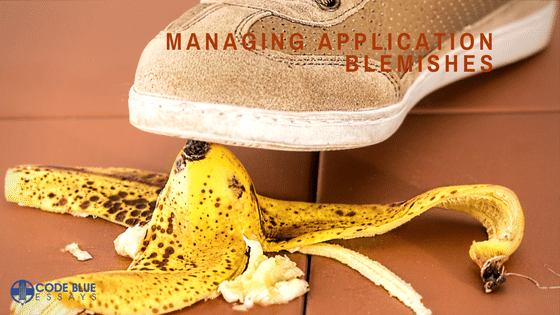Managing Application Blemishes
0 Comments

November 29, 2017 in Admissions, dental school, Medical School, Personal Statement Tips
Application blemishes are a frequent topic of concern for those interested in pursuing a healthcare career. Many applicants to medical school or dental school worry that blemishes on their record will prevent them from being admitted. Whether these concerns are valid depends largely on the type of errors the applicant has in their past. In most cases, academic mishaps are manageable and an applicant can be achieve admission. However, a student with a significant legal history may have more difficulty being accepted to professional school. Regardless of the type of application blemishes a student has, it is helpful to prepare in advance to best manage them and improve the outcome of their applications.
The type of errors a student has in on their record will determine the type of corrective action that will be needed. Some minor mishaps require nothing more than a brief mention during the interview. Other more severe events necessitate significant effort to mitigate damages. If you have an blemishes on your application, the first step is to honestly evaluate the event and determine its severity.
Poor grades are the most common type of application blemish for prospective medical students and dental students. The impact that low grades have on the overall application depend on a few things:
If an applicant has a single low grade, it is unlikely to negatively impact the entire application. However, if an applicant has a generally poor academic record, they will find it extremely difficult gain admission. In this instance, it would be wise to consider attending a graduate or post-baccalaureate program prior to applying to medical school or dental school. It is also a good idea to consider what type of class you had difficulty in. Admissions committees will be less concerned if you performed poorly in an elective, non-science course than if you had difficulty in a core science course. A third factor to consider is if there were any extenuating circumstances which contributed to the academic difficulties. Although admissions committees are not interested in hearing excuses, they will take into consideration if there were genuine reasons that an applicant did poorly in a class.
Legal problems are a major barrier to entering the healthcare field. If an student has a felony history, they should seriously consider alternative career choices. Most medical schools and dental schools will not want to take the risk on somebody with a felony history. Furthermore, it would be exceedingly difficult for somebody with a serious legal history to get licensed even if they achieved admission to a school. Minor legal problems, however, can usually be managed if the applicant can show that they have learned from their errors and have not gotten into trouble since then.
Like legal problems, disciplinary action from a college or university can have devastating effects on a application. Some infractions, like cheating, will make it extremely difficult to gain admission. However, less serious behavior violations should not cause harm to a medical school application.
Once an applicant has objectively evaluated their application blemishes, they should begin making their management plan.
The AMCAS or ADEA AADSAS application will ask about about any inconsistencies in the applicant’s record. It is exceedingly important to be truthful. Most schools conduct background checks on their applicants. The applicant will appear dishonest if they omit a significant event.
Admissions committee members are not interested in excuses. If there were extenuating circumstances for poor grades, it may be appropriate to mention them in the personal statement. However, it is unwise to devote a lot of space explaining why an adverse event occurred.
Schools are interested in prospective students’ ability to learn from their mistakes. Applicants who show that they have grown wiser from their errors are more likely to be forgiven. Furthermore, it is important for applicants to show what steps they have taken to prevent a similar error happening in the future.
Blemishes on the AMCS of ADEA AADSAS application are certainly not ideal. However, they are manageable with careful planning and effort.